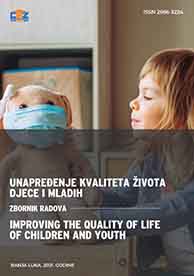SPECIFIČNOSTI RODITELJSTVA S DJECOM NARUŠENOG MENTALNOG ZDRAVLJA
SPECIFICITIES OF PARENTING CHILDREN WITH MENTAL DISABILITY
Author(s): Snježana Šušnjara, Kata BeškerSubject(s): Social Sciences, Psychology, Sociology, Social differentiation, Family and social welfare, Social Norms / Social Control, Pedagogy
Published by: CENTAR MODERNIH ZNANJA
Keywords: parents; children; mental health; stress;
Summary/Abstract: Mental health is capacity of a full and creative life living and is linked with physical health and social functioning. Therefore, it has an important social value. Changes in mental health, new situation and new life conditions and functioning present a large inconvenience with several challenges. The challenges are seen in a social isolation of parents, stigmatization and judgment of society. In the same time, parents do not know where to find a support in order to adapt themselves to new situation and keep functionality of the family. Donenberg & Baker (1993) emphasize that disabilities such as autism, problematic behavior, emotional instability, and psychical decompensations are the real 'problems of psychical health' that generate negative impact on parental social life and emotions related to parenthood. This information contributes more to parents’ stress, family interactions or social status. This paper attempts to present parents' position and their strategies of adaptation to their children mental disabilities and to maintain functioning of their family. In order to better understand the life of family and a child of mental disabilities and community’s attitudes towards them, we will present a research accomplished at the Department of children and adolescent psychiatry in Sarajevo. Parents and children who need support of this institution were included in this research.
Journal: DRUŠTVENE DEVIJACIJE
- Issue Year: VI/2021
- Issue No: 6
- Page Range: 261-270
- Page Count: 10
- Language: Bosnian, Croatian, Serbian

